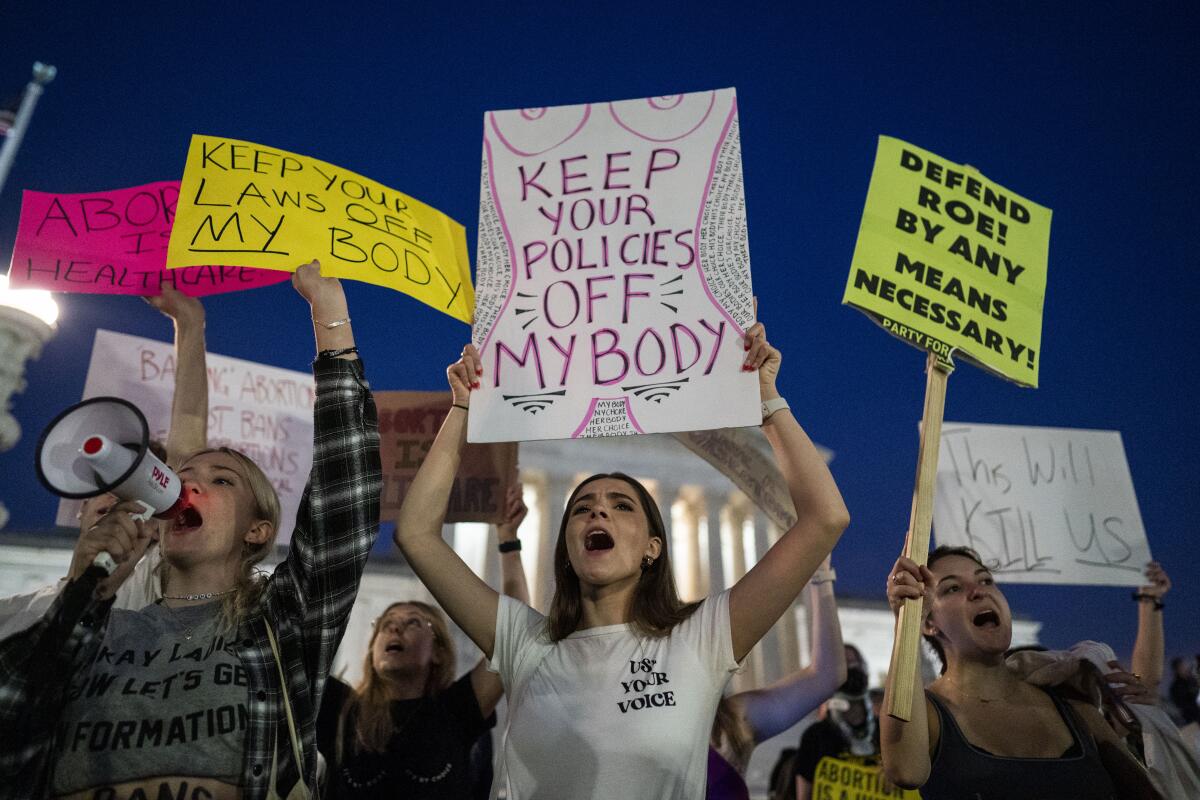Commentary: A declaration of non-independence — for women

- Share via
If men could get pregnant, the saying goes, the Declaration of Independence might well have declared that all men are endowed with the right to life, liberty, the pursuit of happiness and a safe abortion. A colleague once suggested to me that such phrasing wouldn’t have been necessary. It would simply have been taken for granted that men had an inalienable right to terminate a pregnancy.
The eloquent manifesto lays out in detail how the king of Britain had tyrannized the colonists and why they now had a right to create a new government to “effect their Safety and Happiness.” (Lot of “happiness” in the Declaration of Independence.) Given the declaration’s precision of language, I’d expect abortion would have been singled out in the list of rights — just in case anyone reading it thought “liberty” didn’t cover it.
Same with the U.S. Constitution — if men could get pregnant, the white male framers of the Constitution would have written in the right to an abortion. Then we wouldn’t have had Supreme Court Justice Samuel A. Alito Jr. last year complaining he couldn’t find abortion in the Constitution and having to rely on 17th century common laws criminalizing abortion for guidance when he was overturning Roe vs. Wade.
When the Supreme Court overturned this ruling last year, it sent the issue of reproductive rights to the states, where the fight over access has been waged ever since -- and will continue into coming years.
This is the problem.
In America, liberty has never been part of a woman’s brief, and our personal autonomy has neither been spelled out nor assumed. It took suffragettes more than 70 years to win a federal right for women to vote with the ratification of the 19th Amendment to the U.S. Constitution in 1920. Congress still won’t pass the Equal Rights Amendment.
For 49 years, the constitutional right to abortion was spelled out in the Roe vs. Wade decision. Then last year in Dobbs vs. Jackson Women’s Health Organization,
the Supreme Court’s conservative majority, in a rare case of overturning a precedent to take away rights, abolished protection for abortion rights.
Now, instead, what is being spelled out in the law is what women can’t do with their bodies. In some states, they can’t terminate a pregnancy after 12 weeks of gestation, or six weeks — or ever, unless maybe they get so ill during a pregnancy that they will die without an abortion. Millions of child-bearing women live in states with no abortion rights or extremely restricted rights, putting them at risk of having to give birth against their will.
What kind of a country that believes in the pursuit of liberty and happiness does that? According to Human Rights Watch, that would be the U.S., which is breaking several international human rights treaties it signed. “These human rights obligations include, but are not limited to, the rights to: life; health; privacy; liberty; and security of person,” says a report by the group.
The nation was born of revolution but relies for its continued existence and security on the people’s faith in democratic institutions.
Meanwhile, not only has the Senate failed to pass the Women’s Health Protection Act, codifying the right to abortion into federal law, but it couldn’t even manage to pass legislation ensuring a right to contraception. Republicans blocked the bill. Contraception does remain legal by virtue of two landmark Supreme Court rulings — Griswold vs. Connecticut in 1965 and Eisenstadt vs. Baird in 1972— but the fear is that those cases, too, might be overturned, leaving sexually active women with no legal option to avoid pregnancy.
After the 1994 uprising in Chiapas, the Zapatistas enshrined women’s rights into the Women’s Revolutionary Law, which rules the way they live today. It reads in part: “Women have the right to decide how many children they will have and take care of.”
It shouldn’t take another American revolution for women in this country to simply have full autonomy over their bodies. We don’t need a new government. We just need the people who run this one to realize that without personal autonomy there is no liberty.
More to Read
A cure for the common opinion
Get thought-provoking perspectives with our weekly newsletter.
You may occasionally receive promotional content from the Los Angeles Times.













